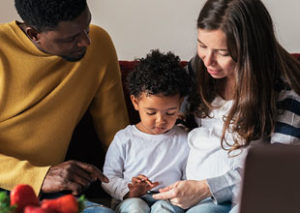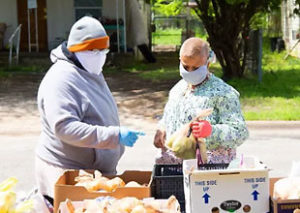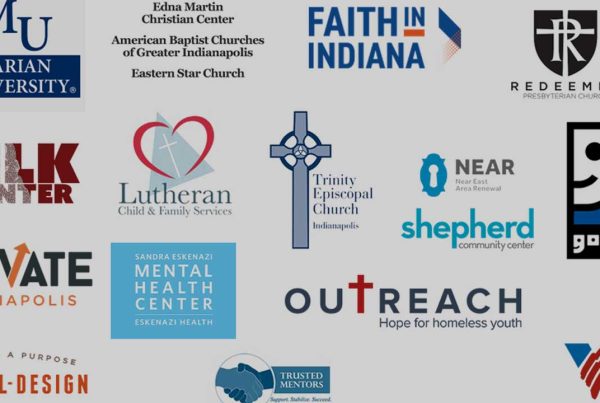A Time for Accomplices
In an Aug. 13 column in the Indianapolis Business Journal, columnist Marshawn Wolley makes the case that, while allies are helpful, what the Black community really needs in its push for justice is accomplices. The difference? Wolley notes that allies say they want to make a difference; accomplices “take actions toward justice in an unjust world.” We love that idea, and we think it applies well to those living in poverty. After all, we’ve spent decades studying ways we can equip people confronting poverty. We’ve been allies in many ways. But, while we certainly take action to relieve immediate needs, we haven’t taken the consistent action necessary to wipe out the injustices that allow poverty to thrive. So what can we do to be accomplices? A lot. For example, while we might feel we have limited influence on government decisions regarding policy changes or income support programs, we do have access to the people making those decisions. Therefore, we can speak out, write letters, demand action and more. We can look at our nonprofit, business and faith communities and ensure that they are committed to a diverse employment work force and a diverse board of control. We can push for diversity and inclusion plans where they don’t already exist. WE can raises our voices on behalf those who have no voice. We can push for a new narrative about poverty that is focused on “all of us” and not “us vs. them.” We can argue for a new social compact committed to everyone’s success. This is especially timely now, as congregations and organizations that walk alongside those living in poverty have pivoted to focus on the emergency needs created by COVID-19. We applaud them for their action, and at the same time encourage all of us to not lose sight of the bigger battle. We need to make sure that we don’t settle into “reaction mode” and forget to fight systemic racism, economic black holes and other forces contributing to poverty. As we embrace our role as accomplices, we look to the faith traditions that compel us. After all, what is it that fuels our faith if it is not the belief that we have an accomplice in our work, our struggles and our successes? It is that faith that gives us a distaste for injustice, and that urges us not simply to seek relief for those in need but to actually contribute to their healing. That is what accomplices can do. Lindsey Nell Rabinowitch Project Director, Faith & Action Project
Learning from Pandemic Responses
 Across the nation, poverty-fighting organizations have sought to respond to the additional pressures put on families on the margin as a result of the COVID-19 outbreak. With responses ranging from additional resources for families to new short-term programming, the efforts have recognized the fact that at-risk populations have been hit hardest by the pandemic and are least equipped to respond. The added benefit of these efforts? These respondents likely are creating innovations that can inform post-pandemic efforts and prepare us to respond to future crises. Examples include Hope Atlanta’s addition of COVID-19 screening, testing and education to its menu of services, as well as Stand Together’s and Family Independence Initiative’s collaborative Give Together Now campaign, which provides cash assistance for families affected by COVID-19.
Across the nation, poverty-fighting organizations have sought to respond to the additional pressures put on families on the margin as a result of the COVID-19 outbreak. With responses ranging from additional resources for families to new short-term programming, the efforts have recognized the fact that at-risk populations have been hit hardest by the pandemic and are least equipped to respond. The added benefit of these efforts? These respondents likely are creating innovations that can inform post-pandemic efforts and prepare us to respond to future crises. Examples include Hope Atlanta’s addition of COVID-19 screening, testing and education to its menu of services, as well as Stand Together’s and Family Independence Initiative’s collaborative Give Together Now campaign, which provides cash assistance for families affected by COVID-19.
Boosting ReEntry Entrepreneurship
 Entrepreneurs with a criminal history might find themselves frustrated when pursuing start-up capital and other resources essential launching a business. Seeking to alleviate that frustration, lower the barriers to self-sufficiency and break the link between incarceration and poverty, The Indy Chamber’s ReEntry Entrepreneurship Development Initiative (REDi) will is hosting its third public pitch competition for formerly incarcerated entrepreneurs. This year’s REDi Pitch Night, to be held virtually on Sept. 16, will allow five entrepreneurs to compete for $2,500 and a package of professional services from in-kind sponsors. The deadline for applications was August 31. Get more information by clicking here.
Entrepreneurs with a criminal history might find themselves frustrated when pursuing start-up capital and other resources essential launching a business. Seeking to alleviate that frustration, lower the barriers to self-sufficiency and break the link between incarceration and poverty, The Indy Chamber’s ReEntry Entrepreneurship Development Initiative (REDi) will is hosting its third public pitch competition for formerly incarcerated entrepreneurs. This year’s REDi Pitch Night, to be held virtually on Sept. 16, will allow five entrepreneurs to compete for $2,500 and a package of professional services from in-kind sponsors. The deadline for applications was August 31. Get more information by clicking here.
Fall Event Examines Current Crises and Poverty
How have our nation’s recent racial and healthcare crises affected the fight to end poverty? What have they taught us about our nation and our community? And how can we use those lessons to strengthen poverty-mitigation efforts? Join us online Sept. 30 at noon for a conversation with national and local leaders in the work for justice and an end to poverty. More information on how to register will be available soon.
Worth Reading
 Articles regarding the support for families during COVID-19, by Brookings. Early in the COVID-19 crisis, the federal government enacted programs designed to offset the worst economic effects. Unfortunately, a number of factors have reduced the impact of those programs. For example, food prices have seen their biggest increase in a half-century, resulting in rapidly increasing food insecurity. In a pair of papers presented at a Brookings conference this summer, a team of economist argue that temporary relief programs should be extended and food support should be increased for poor families. Read a summary of the papers here, or watch a presentation here. Another article asserts that Temporary Assistance for Needy Families, or TANF, should be leveraged to provide much-needed relief. Read it here.
Articles regarding the support for families during COVID-19, by Brookings. Early in the COVID-19 crisis, the federal government enacted programs designed to offset the worst economic effects. Unfortunately, a number of factors have reduced the impact of those programs. For example, food prices have seen their biggest increase in a half-century, resulting in rapidly increasing food insecurity. In a pair of papers presented at a Brookings conference this summer, a team of economist argue that temporary relief programs should be extended and food support should be increased for poor families. Read a summary of the papers here, or watch a presentation here. Another article asserts that Temporary Assistance for Needy Families, or TANF, should be leveraged to provide much-needed relief. Read it here.
Mark your calendar
September 30, 2020: Faith & Action Fall Event at noon





